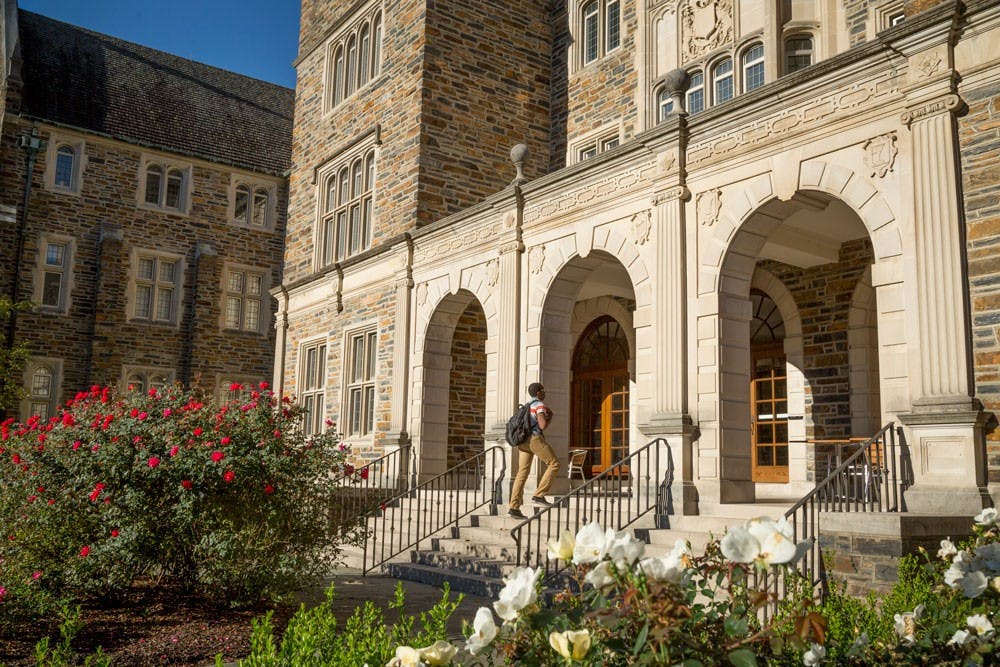Academic Council addressed the announcement that Provost Sally Kornbluth had been elected president of the Massachusetts Institute of Technology in its Thursday meeting.
Kornbluth will stay at Duke through December and begin her term at MIT on Jan. 1, 2023.
“We are filled with mixed emotions, wanting to celebrate this moment with her, but we're also filled with great sadness,” said Erika Weinthal, professor of environmental policy and public policy and chair of the Council.
Kornbluth has been at Duke since 1994 and served as the University’s second-highest ranking officer since 2014.
“Her life's work has really been at Duke. So it is a tremendous loss for Duke today, as much as it is a gain for MIT,” Weinthal said.
Kornbluth and President Vincent Price will speak at next month’s Academic Council meeting about the search and transition to a new provost.
Academic Council also heard an update from Jennifer Lodge, vice president for research and innovation and professor of molecular genetics and microbiology.
Lodge, who has been at Duke for nine months, comes from Washington University in St. Louis. She said that the Office for Research & Innovation’s goal is to facilitate the research enterprise of the University, “providing outstanding service to [Duke’s] researchers and support for the translation of [Duke’s] research scholarship so that it can be used for the public.”
The ORI is focusing on how to streamline industry partnerships, creating a “single open door for [the University’s] external partners to come in [to] help connect [Duke’s] faculty,” Lodge said.
She also added that while the current team is geared towards assisting faculty in the natural sciences, it is looking to expand to help faculty in the social sciences, arts and humanities. In doing so, the ORI will be creating a vice president for research and innovation position, according to Lodge.
“We recognize that we really needed a voice in our leadership team that could speak to multiple disciplines of social sciences, behavioral sciences, humanities, and the arts,” she said.
Lodge said the ORI is looking for faculty input to help steer its initiatives. She also encouraged faculty members to use the resources that the ORI has in place already, including assistance with applying for grants and research budget management. The ORI also provides assistance and resources to postdoctoral scholars.
Lodge also discussed research commercialization, pointing faculty towards the University’s Angel Network of alumni and friends who want to invest in startups.
Lodge then discussed the data management tools that the ORI is providing to help faculty do their research. She said that the University’s rules regarding data management often come from research funding agencies, which are often governmental organizations. The ORI needs to make sure its policy aligns with those standards, she said.
A new draft policy regarding data management, the result of a two year faculty committee discussion, is slated to go into effect in May 2023.
The policy clarifies ownership of data if someone leaves the University and still needs access to do research. It was important to make such clarifications, because “sometimes bad things happen.”
“We've had examples where a postdoc left the University, took the data with them and then refuses to return them,” Lodge said.
Campbell Harvey, J. Paul Sticht professor of international business, asked Lodge about the wait times for Institutional Review Board approval. He said that the current wait is four to six weeks to get IRB approval for research projects involving human subjects. Lodge said that the reason for the delays is that the office is currently understaffed.
Get The Chronicle straight to your inbox
Signup for our weekly newsletter. Cancel at any time.

Adway S. Wadekar is a Trinity junior and former news editor of The Chronicle's 119th volume.

